Local elections 2023: Greens eye first council win in former Tory heartland
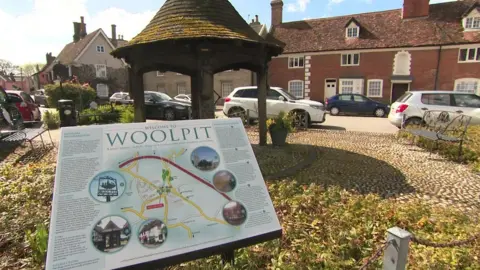 BBC
BBCWoolpit in Suffolk has an intriguing legend. It tells of two children found near the village in the 12th Century.
The big twist: they were both green.
Now modern day Woolpit is part of a political battle that could see the district council, Mid Suffolk, turn a similar hue.
The largely rural district with some traditional chocolate box villages and a heavy reliance on cars for transport and oil to heat homes might not seem the most obvious place for the Green party to target and win over.
In elections in 2019, though, they more than doubled their seats on the council, from five to 12, and the Conservatives lost their majority.
The Greens are now confident they can overtake the Conservatives to become the biggest party and, perhaps, even make history by winning an outright majority on a council for the first time in May's local elections.
The Greens would need to win another six seats to win a majority; the Conservatives could take back control if they win two.


One issue which appears to be benefitting the Greens politically is large-scale housing development because of concerns that the rural environment would be damaged.
Opposite a carved wooden water pump, built to mark Queen Victoria's Diamond Jubilee, near to the old Post Office and nestling next to a pink half-timbered teashop, is the Woolpit Institute.
In an upstairs room, decorated with tapestries depicting the village's evolution, 10 people in their sixties and seventies are politely, but competitively, playing one another at table tennis.
Just down the road from the Institute, the diggers and earthmovers are out on a patch of land which will eventually add another 300 homes to the village.
In between dodging stray ping pong balls, resident Paul Proctor and club founder Lynda Moore say large-scale housebuilding is a worry.
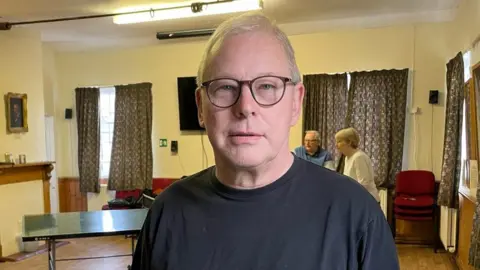
Paul says: "I think, with the sheer volume of building and the number of people that will be moving into the area, probably the main concern is about the facilities, can they cope?"
Lynda worries about losing what she describes as the "wonderful community life" of the village and thinks it will just mean more people commuting out.
"They haven't done anything about the road, which they need to. They haven't enlarged our school, where are all the children going to go? And what about jobs? There are no jobs in Woolpit."
She also voices concerns about losing agricultural land to solar farms. Suffolk has become something of a centre for energy infrastructure.
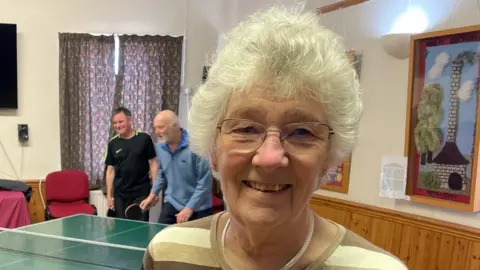
So what else might be fuelling the Greens' hopes for a win in Mid Suffolk in particular?
It's difficult to pin down one precise reason.
In small villages, word gets around and at least some of their success seems to have been built on simply being visibly active in their local communities.
They've had a presence on the council for 20 years and had gained a few more councillors at each subsequent election before 2019's overnight boost.
This year, the Greens and the Conservatives are the only options on the ballot paper in more than a third of the seats up for election in Mid Suffolk, including Woolpit.
That may help explain some of the confidence from the Greens, who often struggle to gain ground under the first-past-the-post system.
The Lib Dems, Labour and Reform are standing candidates in some wards, including in Stowmarket, the district's biggest town.
Among the handful of stalls in the centre of Stowmarket's Thursday market is one selling "zero-waste" products.
It's just one sign of a generally heightened awareness of environmental issues, which may help the Greens.
There's evidence too of disillusion with "politics as usual".
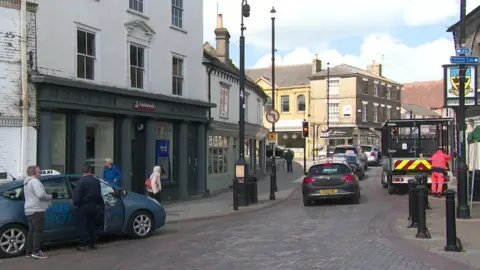
In a pedestrian precinct backing on to a large supermarket is Zarkey's shoe repair shop and key cutters.
Its owner Paul Zyrkos, has been on the site for nine years, and he says running the business at the moment is "a bit up and down".
"I'm coming into work every day wondering whether you're going to get the people through the door. Looking outside and seeing the footfall in this town just disappear completely is just very scary.
"I think the country's in a mess, but I would like someone who would come into this town and start to look at what they can do."
He, along with other traders, wants to see parking made free to encourage in more people.
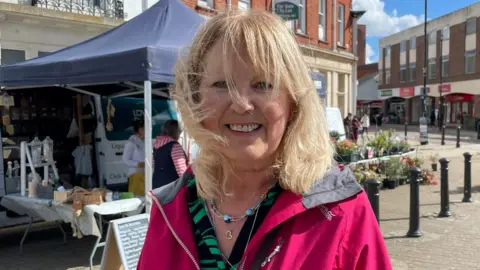
Helena, out walking her terrier Herbert, says the town centre is the "worst it's been" for empty shops in the almost 30 years she's lived in Stowmarket.
"It just seems to be a shame that there doesn't seem to be enough local business in the High Street to support the existing businesses that are here. If it was a tiny little town where people were just moving out, I could understand it... But it's not."
She acknowledges that it is the "same in a lot of towns".
That's why the outcome of this election could be significant.
The Greens often argue that one of the problems they face is that people don't vote for them because in some places they just don't think they can get elected.
If they can win here, it is likely to give them more credibility as contenders in other areas of traditionally Conservative rural England.
Recent visible successes have often come for them in cities such as Brighton & Hove, which they currently run as a minority administration and where Labour is pushing hard to take control.
If they lose ground in Suffolk this time, though, they could miss out on their best chance to take a council in many years.
With so many specific local issues in play, what a win could mean for their chances in a general election is much harder to predict.
This is the latest in a series of articles looking at the local elections. You can read about the Liberal Democrats' campaign in Newbury here, Conservatives in Derbyshire here and Labour in Warwickshire here.
